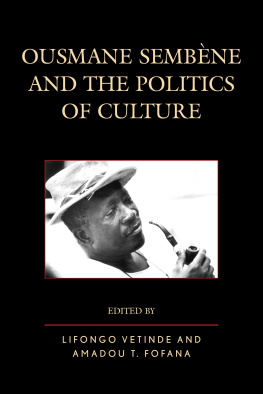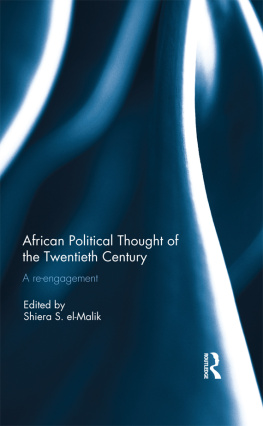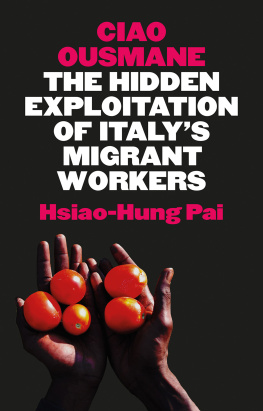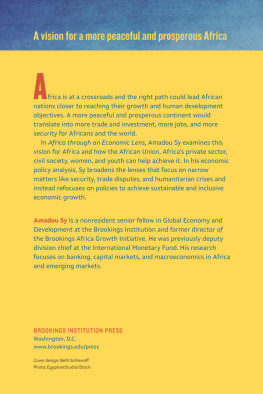Lifongo Vetinde and Amadou T. Fofana - Ousmane Sembène and the Politics of Culture
Here you can read online Lifongo Vetinde and Amadou T. Fofana - Ousmane Sembène and the Politics of Culture full text of the book (entire story) in english for free. Download pdf and epub, get meaning, cover and reviews about this ebook. year: 2012, publisher: Lexington Books, genre: Politics. Description of the work, (preface) as well as reviews are available. Best literature library LitArk.com created for fans of good reading and offers a wide selection of genres:
Romance novel
Science fiction
Adventure
Detective
Science
History
Home and family
Prose
Art
Politics
Computer
Non-fiction
Religion
Business
Children
Humor
Choose a favorite category and find really read worthwhile books. Enjoy immersion in the world of imagination, feel the emotions of the characters or learn something new for yourself, make an fascinating discovery.
- Book:Ousmane Sembène and the Politics of Culture
- Author:
- Publisher:Lexington Books
- Genre:
- Year:2012
- Rating:3 / 5
- Favourites:Add to favourites
- Your mark:
- 60
- 1
- 2
- 3
- 4
- 5
Ousmane Sembène and the Politics of Culture: summary, description and annotation
We offer to read an annotation, description, summary or preface (depends on what the author of the book "Ousmane Sembène and the Politics of Culture" wrote himself). If you haven't found the necessary information about the book — write in the comments, we will try to find it.
Ousmane Sembène and the Politics of Culture — read online for free the complete book (whole text) full work
Below is the text of the book, divided by pages. System saving the place of the last page read, allows you to conveniently read the book "Ousmane Sembène and the Politics of Culture" online for free, without having to search again every time where you left off. Put a bookmark, and you can go to the page where you finished reading at any time.
Font size:
Interval:
Bookmark:
Ousmane Sembne and the Politics of Culture
After the Empire: The Francophone World and Postcolonial France
Series Editor: Valrie Orlando, University of Maryland
Advisory Board
Robert Bernasconi, Memphis University; Claire H. Griffiths, University of Chester, UK; Alec Hargreaves, Florida State University; Chima Korieh, Rowan University; Mildred Mortimer, University of Colorado, Boulder; Obioma Nnaemeka, Indiana University; Kamal Salhi, University of Leeds; Tracy D. Sharpley-Whiting, Vanderbilt University; Nwachukwu Frank Ukadike, Tulane University
Recent Titles
Ousmane Sembne and the Politics of Culture, edited by Lifongo J. Vetinde and Amadou T. Fofana
Reimagining the Caribbean: Conversations among the Creole, English, French, and Spanish Caribbean, edited by Valrie K. Orlando and Sandra Messinger Cypress
The French Colonial Imagination: Writing the Indian Uprisings, 185758, from Second Empire to Third Republic, by Nicola Frith
Narratives of the French Empire: Fiction, Nostalgia, and Imperial Rivalries, 1784 to the Present, by Kate Marsh
African Pasts, Presents, and Futures: Generational Shifts in African Women's Literature, Film, and Internet Discourse, by Touria Khannous
Writing the Nomadic Experience in Contemporary Francophone Literature, by Katharine N. Harrington
The Body Besieged: The Embodiment of Historical Memory in Nina Bouraoui and Lela Sebbar, by Helen Vassallo
Writerly Identities in Beur Fiction and Beyond, by Laura Reeck
Frances Lost Empires: Fragmentation, Nostalgia, and la fracture coloniale, edited by Kate Marsh and Nicola Frith
Globalizing the Postcolony: Contesting Discourses of Gender and Development in
Francophone Africa, by Claire H. Griffiths
Writing and Filming the Genocide of the Tutsis in Rwanda: Dismembering and
Remembering Traumatic History, by Alexandre Dauge-Roth
The Star, the Cross, and the Crescent: Religions and Conflicts in Francophone Literature from the Arab World, by Carine Bourget
Ousmane Sembne and the Politics of Culture
Edited by Lifongo Vetinde and Amadou T. Fofana
LEXINGTON BOOKS
Lanham Boulder New York London
Published by Lexington Books
An imprint of The Rowman & Littlefield Publishing Group, Inc.
4501 Forbes Boulevard, Suite 200, Lanham, Maryland 20706
www.rowman.com
Unit A, Whitacre Mews, 26-34 Stannary Street, London SE11 4AB
Copyright 2015 by Lexington Books
All rights reserved. No part of this book may be reproduced in any form or by any electronic or mechanical means, including information storage and retrieval systems, without written permission from the publisher, except by a reviewer who may quote passages in a review.
British Library Cataloguing in Publication Information Available
Library of Congress Cataloging-in-Publication Data
Ousmane Sembene and the politics of culture / edited by Lifongo J. Vetinde and Amadou T. Fofana.
pages cm. -- (After the empire: the francophone world and postcolonial France)
Includes bibliographical references and index.
ISBN 978-0-7391-9254-2 (cloth : alk. paper) -- ISBN 978-0-7391-9255-9 (electronic)
1. Sembene, Ousmane, 1923-2007--Criticism and interpretation. 2. Senegalese literature (French)--History and criticism. 3. Motion pictures--Senegal--History. 4. Culture in literature. 5. Culture in motion pictures. I. Vetinde, Lifongo J. II. Fofana, Amadou Tidiane, 1965- editor of compilation. III. Series: After the empire.
PQ3989.S46Z78 2014
843.914--dc23
2014036921
 TM The paper used in this publication meets the minimum requirements of American National Standard for Information Sciences Permanence of Paper for Printed Library Materials, ANSI/NISO Z39.48-1992.
TM The paper used in this publication meets the minimum requirements of American National Standard for Information Sciences Permanence of Paper for Printed Library Materials, ANSI/NISO Z39.48-1992.
Printed in the United States of America
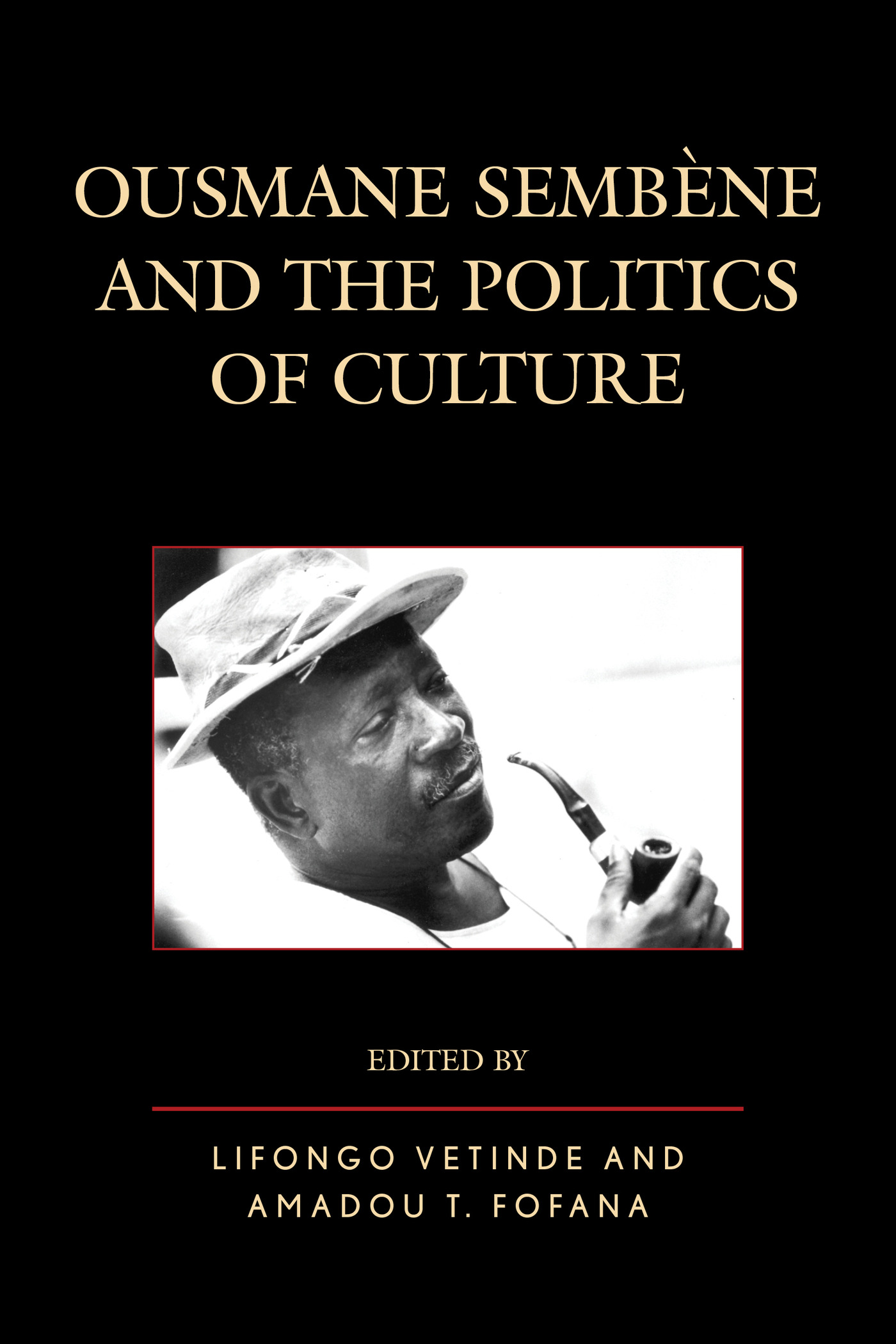
The idea of this book goes back to the thirty-second annual meeting of the African Literature Association that was held in Accra, Ghana in 2006. During that meeting, a group of scholars, including the editors of this volume, formed the Society for the Study of Sembne (SSS) whose principal objective is to contribute in the dissemination of critical studies on Sembnes oeuvre. We are thankful to many friends and colleagues for their support in producing this anthology. We would like to particularly thank Jude Akudinobi at the University of California, Santa Barbara, Kenneth Nolly at Willamette University, and Ayo Coly at Dartmouth College for their input in the initial phase of the project. We also thank colleagues at Lawrence University for their help: Judith Holland Sarnecki for proofreading some of the chapters and Lori Rose for her work on formatting the text. Special thanks are due to Daour Wade at the African Consultants International (ACI) (also known as Centre Baobab), Dakar, Senegal, for kindly introducing us to Ousmane Sembnes close collaborators who were interviewed for this book. Thanks to Seydou Nourou Ndiaye, the manager of Editions Papyrus Afrique, in Dakar, and the Office of the Provost and Dean of the Faculty, Lawrence University, for their support. Finally, we would also like to thank our very dynamic editors at Lexington Books for their assistance in preparing the manuscript for publication.
Lifongo Vetinde
Cultural Politics in Senegal: A Quest for Relevance
Culture in all its aspects is political. Ousmane Sembne
According to Nobert Elias, the German sociologist, the concept of Kultur mirrors the self-consciousness of a nation which had constantly to seek out and constitute its boundaries anew, in a political as well as spiritual sense, and again, had to ask itself: What is really our identity? (1978: 56). I concur, for culture is the measure of what constitutes a peoples specificity: their customs, traditional values, art, cuisine, forms of communication, and elements of social contract. It is indeed the window through which we can understand the way a society perceives itself in relation to others. The role of politics in shaping cultural practice has been the subject of discussion by social critics such as Antonio Gramsci who, in his discussion of the affinity between culture and hegemony, posits that the cultural values that are upheld in society are, for the most part, transmitted by the ruling class.
The nexus between culture and power is particularly evident in the colonial context where the devaluation and stigmatization of indigenous cultures constitute an important element in the apparatus of domination. Indeed, the repression of the subalterns culture is an efficient method of domination. As Amilcar Cabral put it in his lecture, National Liberation and Culture, delivered at Syracuse University, New York, in 1970:
History teaches us that, in certain circumstances, it is very easy for the foreigner to impose his domination on a people. But it also teaches us that, whatever may be the material aspects of this domination, it can be maintained only by the permanent, organized repression of the cultural life of the people concerned. Implantation of foreign domination can be assured definitively only by physical liquidation of a significant part of the dominated population.... In fact, to take up arms to dominate a people is, above all, to take up arms to destroy, or at least to neutralize, to paralyze, its cultural life. (
Font size:
Interval:
Bookmark:
Similar books «Ousmane Sembène and the Politics of Culture»
Look at similar books to Ousmane Sembène and the Politics of Culture. We have selected literature similar in name and meaning in the hope of providing readers with more options to find new, interesting, not yet read works.
Discussion, reviews of the book Ousmane Sembène and the Politics of Culture and just readers' own opinions. Leave your comments, write what you think about the work, its meaning or the main characters. Specify what exactly you liked and what you didn't like, and why you think so.

